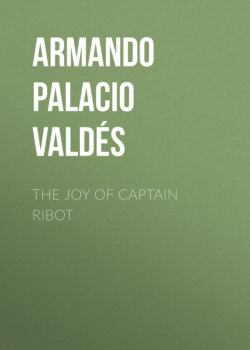Читать книгу The Joy of Captain Ribot - Armando Palacio Valdés - Страница 3
Introduction
Оглавление"We Americans are apt to think because we have banged the Spanish war-ships to pieces that we are superior to the Spaniards, but here in the field where there is always peace they shine our masters. If we have any novelists to compare with theirs at their best, I should be puzzled to think of them, and I should like to have some one else try"—wrote William Dean Howells in Literature.
When a work by one of the world's masters of fiction has called forth a remark like the foregoing from a leading man of letters in America, it would be a misfortune if the public to whom the remark is addressed might not enjoy the privilege of acquaintance with that work. And it was this most charming novel by Señor Armando Palacio Valdés, "La Alegria del Capitán Ribot," that prompted Mr. Howells to write those words. Any reader must be hard to please who would not take the keenest delight in a story presented with a touch so delicate. The scene is laid in Valencia, one of the earth's famous garden spots, where the touch of the classic hand, laid upon the spot ages ago yet lingers. It is a story dominated by the purest joy, as its serene Mediterranean landscape is dominated by the purest sunshine.
Every novelist of character must have some purpose in mind in a given work, and the purpose of Señor Valdés in this is of no slight import. It happens that, from an unclean quality that distinguishes the fiction of a certain nation, the minds of many lands have been infected. For the almost universal aim of its authors has seemed to be so pervasively to color their pictures of life with one particular kind of sin as to give the impression that it is a main factor of modern civilization, instead of something that blots but a small proportion of the lives of men and women in any land. So, when Señor Valdés wrote to me, several months ago, about his new novel, he said: "It is a protest from the depths against the eternal adultery of the French novel." And when I read the book, I thought that "A Married Woman" would have been a good name for the story, so nobly and so truly does it present a type of the true and devoted wife in Cristina Martí—one of the great creations in modern literature. The trait that makes Señor Valdés one of the most eminent of living novelists is greatness of soul, finding expression as it does in a consummate mastery of his art. That trait appears in his "La Fé" as in no other novel that I know; and in the present story it pervades the whole work, which, moreover, is clean, sweet, and wholesome in every part. Magnanimity is a word that somehow implies that greatness of soul derives itself from greatness of heart, and the magnanimity of Señor Valdés is of a degree that transcends limitations of race, of creed, and of patriotism.
He has given evidence that in his catholic sympathies the fact of a common humanity is sufficient for the inclusion of any man in his brotherly regard. Of such as he the nations as yet count too few among their sons. And when one of these speaks, no difference of tongue should be allowed to bar our listening.
In the same article that has furnished the text for these remarks, Mr. Howells notes, among the admirable attributes in which this noble-minded Spaniard excels, "something very like our own boasted American humor with some other things which we cannot lay special claim to; as a certain sweetness, a gentle spirituality, a love of purity and goodness in themselves, and an insight into the workings of what used to be called the soul." As to the specific qualities of the book before us, I cannot better express my own sentiments than to continue in the words of Mr. Howells:
"La Alegria del Capitán Ribot is, as all the stories of this delightful author are, a novel of manners, the modern manners of provincial Spain; and, by the way, while we were spoiling our prostrate foe, I wish we could have got some of these, too; they would form an agreeable relief to our own, which they surpass so much in picturesqueness, to say the least. The scene is mostly at Valencia, where Capitán Ribot, who commands a steamer plying between Barcelona and Hamburg, is the guest of the civil engineer, Martí. The novel is, as far as Ribot and his two friends are concerned, a tender idyll, but on the other side it is an exquisite comedy, with some fine tragic implications. Around all is thrown the atmosphere of a civilization so different from our own, and of a humanity so like the Anglo-Saxon, as well as the Russian and the Scandinavian, even, that we find ourselves charmed at once by its strangeness and its familiarity. There are the same temptations, the same aspirations, the same strong desires, the same trembling resolutions, masking under southern skies and in alien air; but instantly recognizable by their truth to what all men feel and know."
Mr. Howells has expressed a desire to have Señor Valdés for our own. So far as a most intelligently sympathetic presentation of this beautiful story in English can do so, I am sure that my friend the translator has made him so.
SYLVESTER BAXTER.
